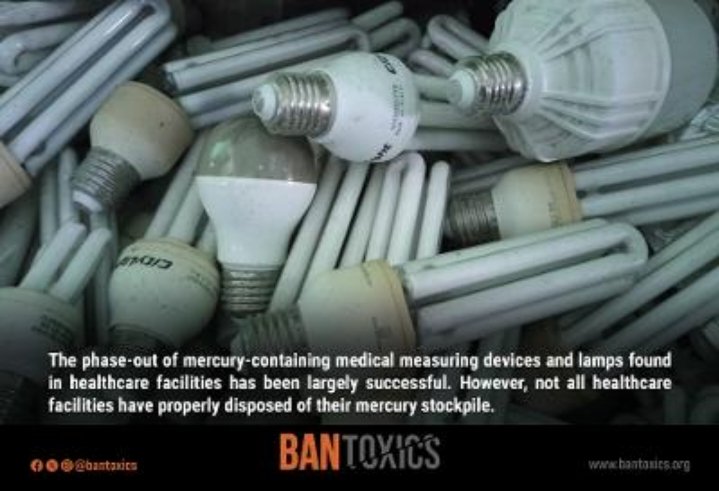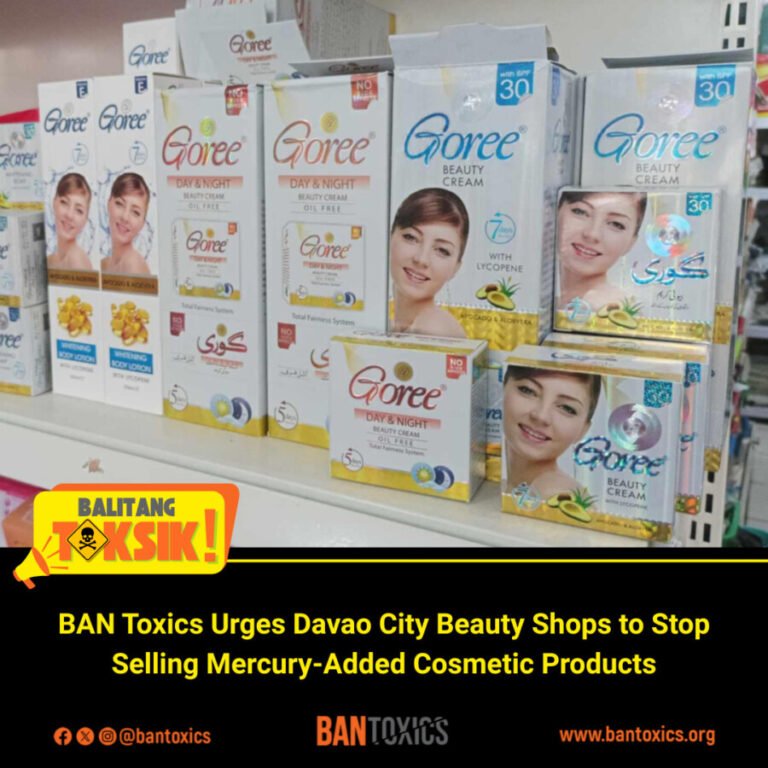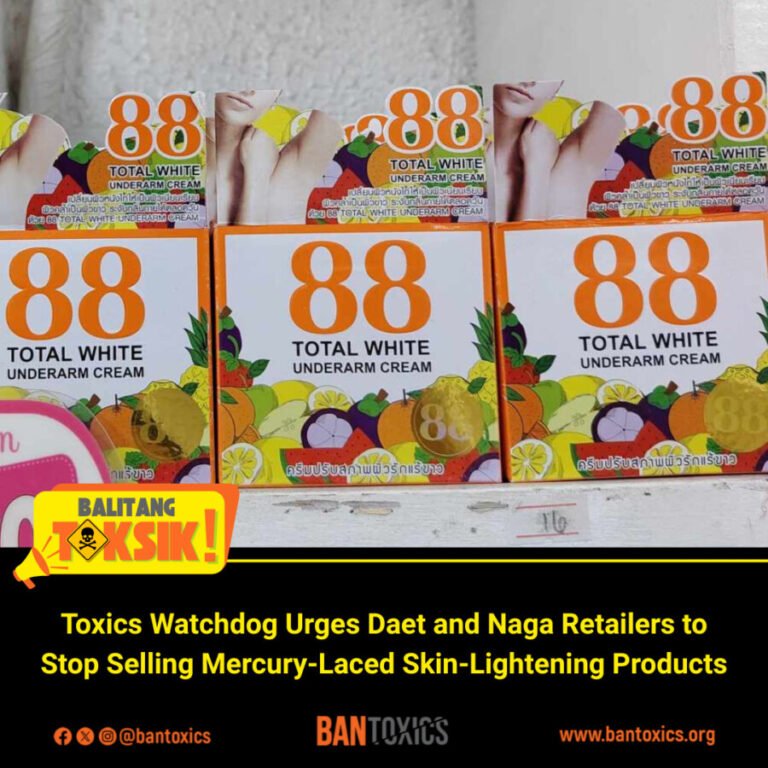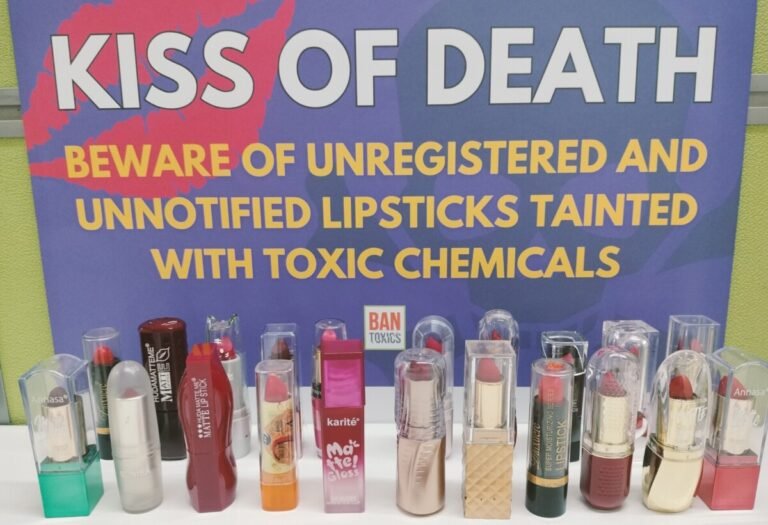
SEVEN years since the Minamata Convention on Mercury entered into force, environmental NGO BAN Toxics reiterates its call for stronger intergovernmental cooperation to address the illegal manufacturing, import, and export of elemental mercury and mercury-added products.
“Addressing mercury pollution for a country like the Philippines, which doesn’t have mercury mining, will require concerted efforts with other countries to prevent the entry and trade of illegal mercury and mercury-containing products. Despite existing laws and regulations, preventing the transboundary trade of illegal mercury remains the biggest challenge for our regulatory and enforcement agencies,” said Jam Lorenzo, head of BAN Toxics’ Policy Development and Research Unit.
Research studies on mercury trade have documented cases of elemental mercury smuggling into the Philippines via backdoor routes using boats. Cinnabar deposits are mined in Mexico, Indonesia, and potentially China, where mercury usage is high. Mercury has been transported by boats across the Indonesian archipelago, with shipments to the Philippines, particularly from Manado to Mindanao, according to the Global Initiative Against Transnational Organized Crime.

During his presentation at the Minamata Secretariat Workshop on Mercury Trade held in Talisay, Batangas in June, Geri Geronimo-Sañez of the DENR-EMB acknowledged the challenges in enhancing border control and monitoring online sales of mercury-added products amid evolving e-commerce landscape.
Mercury is a highly toxic chemical that can cause irreparable damage to the nervous system. It has long environmental persistence and global mobility—cycling through the atmosphere, ocean, and land. Its emissions and releases can bioaccumulate and biomagnify in the food chain, posing a significant threat to human health and the environment.
On August 16, 2017, the Minamata Convention on Mercury—a global treaty to protect human health and the environment from man-made emissions and releases of mercury and mercury compounds—came into force.
The Convention was named after Minamata Bay in Japan, where, in the mid-20th century, mercury-contaminated industrial wastewater poisoned thousands, causing severe health damage that became known as the “Minamata disease.”
It addresses mercury pollution by limiting mining, regulating trade, reducing and, where feasible, eliminating mercury use in products and processes, controlling emissions, and promoting safe waste disposal. To date, there are 148 parties to the Convention, including the Philippines, which ratified the treaty in August 2020.
BAN Toxics has been advocating for the elimination of mercury for more than a decade and has been active in international negotiations and treaty conferences.
According to Lorenzo, mercury enters the country either in its elemental form or through items laced with mercury, such as skin-lightening creams, dental amalgams, and fluorescent lights.
The country has developed and issued several policies to regulate mercury, most notably the Revised Chemical Control Order for Mercury and Mercury Compounds, also known as the Department of Environment and Natural Resources (DENR) Administrative Order 2019-20. The Department of Health (DOH) also issued Administrative Order No. 2020-0020 regarding the phase-out of dental amalgams. Additionally, the Food and Drug Administration (FDA) issued FDA Circular No. 2022-003, which bans all mercury-added thermometers, sphygmomanometers, and dental amalgam capsules. The FDA also regularly issues advisories banning identified mercury-containing skin-lightening products.
Continuous market monitoring by BAN Toxics reveals that over-the-counter or under-the-table sales of prohibited cosmetics in beauty stores within shopping malls, public markets, general merchandise stores, and on online e-commerce platforms persist.
“In our constant monitoring of mercury-containing skin-lightening products, we can confidently say that there is no decrease in the number of products being sold; instead, we are seeing more products and sellers entering the market. This indicates that the illegal manufacturing and trade of these products remain unaddressed by countries that, if the product labels are accurate, are parties to the Minamata Convention,” said Thony Dizon, BAN Toxics Campaign and Advocacy Officer.
Dizon is referring to Pakistan, Thailand, China, and India as the countries where most illegal cosmetics are purportedly manufactured.
Recently, BAN Toxics identified a Thailand-made cosmetic product named Dr. Yanhee Facial Cream, which has not yet been certified by the FDA, circulating on online platforms Lazada and Shopee. The product has mercury concentrations ranging from 11,300 to as high as 23,800 parts per million (ppm). It claims to have been tested by Yanhee International Hospital and certified by ISO and the FDA.
Currently, the Minamata Convention, as well as the DENR and FDA, has set an allowable limit of 1 ppm mercury content for skin-lightening products. However, BAN Toxics maintains that there is no safe level of exposure to mercury.
BAN Toxics has written to the FDA to conduct post-market surveillance and subsequently issue an advisory to warn the public against this product.
“There has been a marked increase in the use of online platforms for selling mercury-containing cosmetics, and this has largely gone unregulated. As of February 2024, we have identified over 1,000 sellers of these prohibited products on Lazada, Shopee, and Facebook Marketplace,” Dizon shared.
In a submission to the Minamata Convention regarding the trade of mercury-added cosmetics, BAN Toxics identified Malaysia, Thailand, and Vietnam as intermediary or transit countries for the online sale of these products.
Meanwhile, Lorenzo notes that another significant source of mercury emissions and releases in the country is the artisanal small-scale gold mining sector, which is identified globally as a major contributor. Mercury is used in mining to capture gold from milled ores.
“Our consultations with small-scale gold miners reveal that mercury use in the sector remains prevalent due to insufficient support for mercury-free technologies and alternatives. As a poverty-driven sector that relies on subsistence mining, the transition to mercury-free processes needs to be supported by the government. At the same time, efforts must be made to prevent the entry of illegal mercury into the country. While there are sellers of mercury, there will inevitably be users, underscoring the need for intergovernmental cooperation to address illegal trade and entry into the country,” said Lorenzo.
“Intergovernmental cooperation can take the form of collaboration arrangements on information exchange, market surveillance, and technical or financial assistance to enhance capabilities for detecting illegal products.”
As for mercury-containing medical measuring devices (MCMMDs) and lamps found in hospitals or healthcare facilities, Lorenzo said that a study conducted by BAN Toxics and published in 2022 showed that the phase-out of these products has been largely successful. However, he noted that not all healthcare facilities have disposed of their MCMMDs properly. In those that have disposed of them, a significant percentage were discarded through municipal waste or sold to third-party buyers, posing a risk of releasing mercury into the environment.
BAN Toxics is currently working with the United Nations Industrial Development Organization (UNIDO) and the Environmental Management Bureau (EMB) of the DENR on the Philippine Healthcare and Mercury Wastes Management Project. One of the main components of this 5-year project, funded by the Global Environment Facility (GEF), is to assist hospitals with the inventory and proper disposal of mercury stockpiles.
“The anniversary of the Minamata Convention is a milestone worth celebrating, as we have seen significant progress in our advocacy for a mercury-free world over the past years. However, we still have a long way to go. Parties involved in the Convention should strive to work together to advance our shared goals and overcome the remaining challenges,” Lorenzo concluded.







